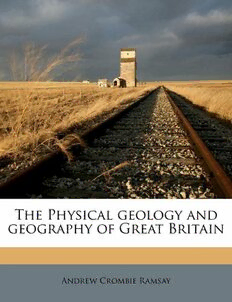
The Physical Geology And Geography Of Great Britain PDF
644 Pages·2010·113.438 MB·English
Most books are stored in the elastic cloud where traffic is expensive. For this reason, we have a limit on daily download.
Preview The Physical Geology And Geography Of Great Britain
Description:
Purchase of this book includes free trial access to www.million-books.com where you can read more than a million books for free. This is an OCR edition with typos. Excerpt from book: 54 LECTURE III. THE PHYSICAL STRUCTURE OF ENGLAND. The geology of England and Wales is much more comprehensive than that of Scotland, in so far that it contains a great many more formations, and its features, therefore, are more various. England is the very Paradise of geologists, for it may be said to be in itself an epitome of the geology of almost the whole of Europe. Very few known geological formations are absent in England, and when they are so, with few exceptions, these are of minor importance. In some countries larger than England the whole surface is occupied by one or two formations, but here, we find all the formations shown in the column (page 20) more or less developed. Those of Silurian age lie chiefly in the north of England in Cumberland and Westmoreland, and, in the west, in Wales and Cornwall. Above them lie the Old red sandstone and Devonian rocks, occupying vast tracts in Herefordshire, Worcestershire, South Wales, and in Devonshire and Cornwall.England and Wales. ss Above the Old red sandstone comp the Carboniferous limestone and the Coal-measures, which in South Wales skirt the Bristol Channel, and stretch into the interior, while in the north they form a great backbone of country that reaches from the borders of Scotland down to North Staffordshire and Derbyshire. Other patches, here and there, rise from below the Secondary strata of the heart of England, and skirt the older formations in the west from Shropshire to Anglesey. The general physical structure of our country from the coast of Wales to the Thames, will be easily understood by a reference to fig. 6 and to the following descriptions, and this structure is eminently typical, explaining, as it does, the physical geology of the chief part of England south of the Staffordshire and De...
See more
The list of books you might like
Most books are stored in the elastic cloud where traffic is expensive. For this reason, we have a limit on daily download.
